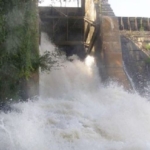
Upper East Regional Minister, Donatus Atanga Akamugri, has appealed to the National Disaster Management Organisation (NADMO) to urgently dispatch relief items to the region as the spillage of the Bagre Dam continues to threaten lives and property.
Mr Akamugri, who toured the Nungu community in the Talensi District to assess the situation, said although no community members had been displaced yet, some farmlands were already submerged, and the advancing water was just about 300 meters from settlements in the area.
He warned that any torrential rainfall in addition to the spillage could displace residents, stressing the need for immediate action.
“We have written to NADMO already. What we want is for them to quickly release the items, roofing sheets, clothing, boots, nets and other materials, so that we can prepare ahead. We don’t want a situation where people are hit, become homeless, and are left at the mercy of the weather before assistance arrives,” he advised.
The Minister noted that the spillage, which has become an annual challenge, could not be stopped but its impact could be mitigated through early interventions.
He underscored the urgency of positioning relief items within the region for quick deployment.
The Minister said although the spillage was currently slow, residents must remain cautious and avoid getting close to the riverbanks, adding that some farmlands, which had been submerged, could get worse if there were to be any torrential rain.
On his part, Mr John Millim Nabwomya, the Talensi District Chief Executive (DCE), said the district had stepped up public education, advising residents along the riverbanks to move their belongings to safer areas.
Mr Edward Abugre Ayine, Deputy Regional Director of NADMO in charge of Technical, confirmed that sensitisation campaigns were ongoing and that communities were responding by moving to higher grounds.
Meanwhile, Naaba Wuni Bugre, Nungu community chief, welcomed the Minister’s visit and appealed for government support to address additional challenges such as poor road networks and the lack of electricity in the community.




